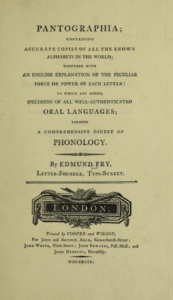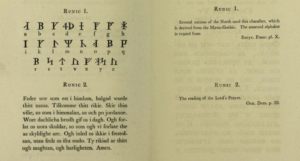Pantographia: Containing Accurate Copies of All the Known Alphabets in the World
Our friends at the Public Domain Review have posted Edmund Fry’s Pantographia: Containing Accurate Copies of All the Known Alphabets in the World from 1799. It contains 405 alphabets from 164 languages. PDR notes that, “To get these letters into print, Fry carved each one onto a steel punch, which could be pressed into a copper matrix for printing. It took him sixteen years, four thousand punches, and an estimated ten thousand hours of labor.”

Some of the alphabets are the ones you would expect from an educated gentleman of the late 18th century—Latin (12 options), Greek (39 varieties!), and Phoenician. There are many surprises, however, including North American Indigenous languages fitted to the Roman alphabet (awkwardly, many times), six varieties of Arabic, and many languages noted as “a dialect of” some far-off land that we know today by another name, e.g. “The Sandwich Islands”, which we call Hawaii).
The book uses the Christian Lord’s Prayer as its example text for almost all of the languages, an understandable choice for the time of publication. It includes a few vocabulary words for some languages, which have a few common words (mother, father, house), but the differing words reveal more about the culture the language is from, and Fry’s perspective on that culture, than Fry probably intended.
Pages 244-245 feature the “Runic” alphabet of Iceland:

If you have any interest in alphabets, languages, or historical books, I recommend checking out the uploaded book—it’s fascinating, and I enjoyed it greatly!

Leave a Reply